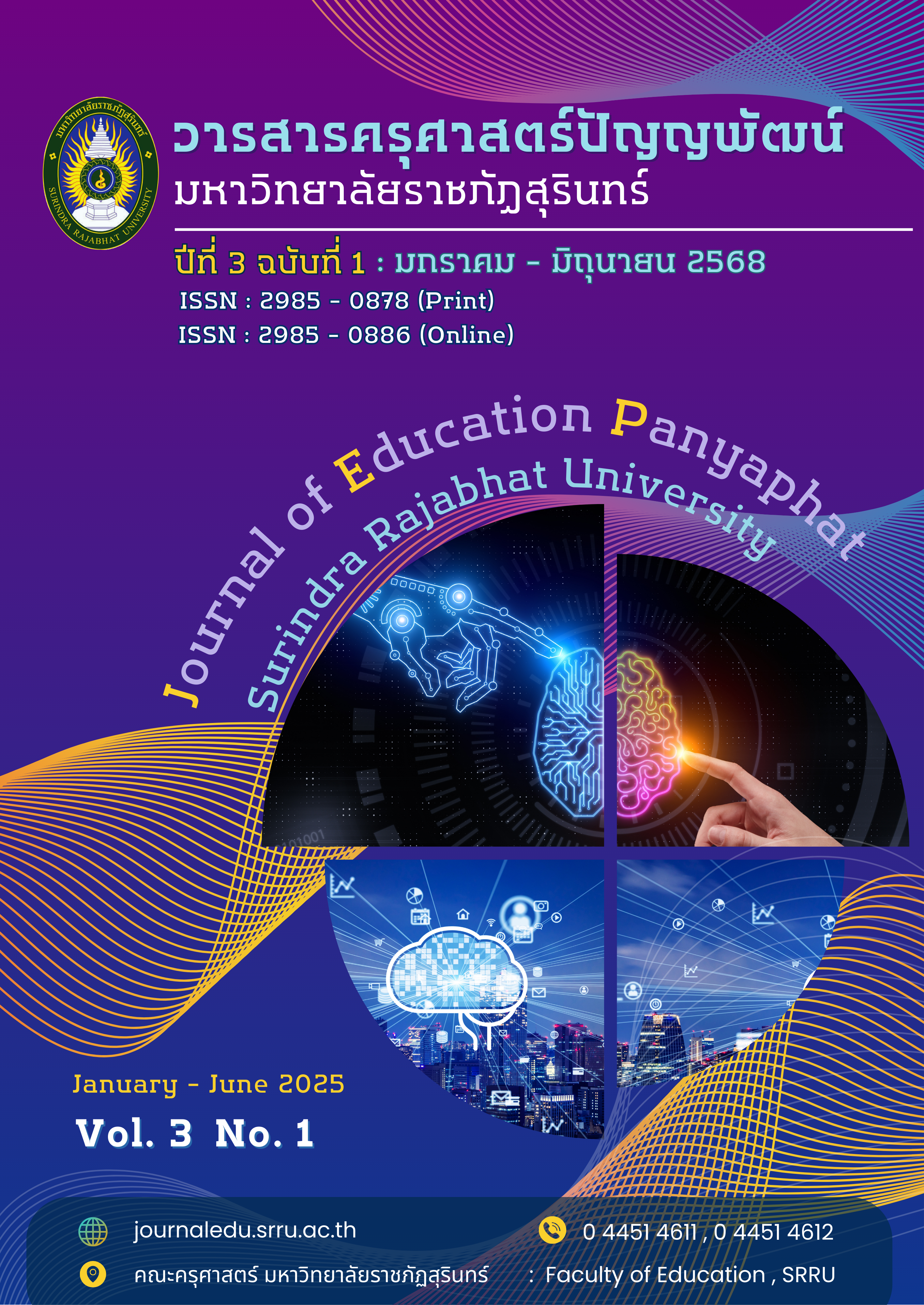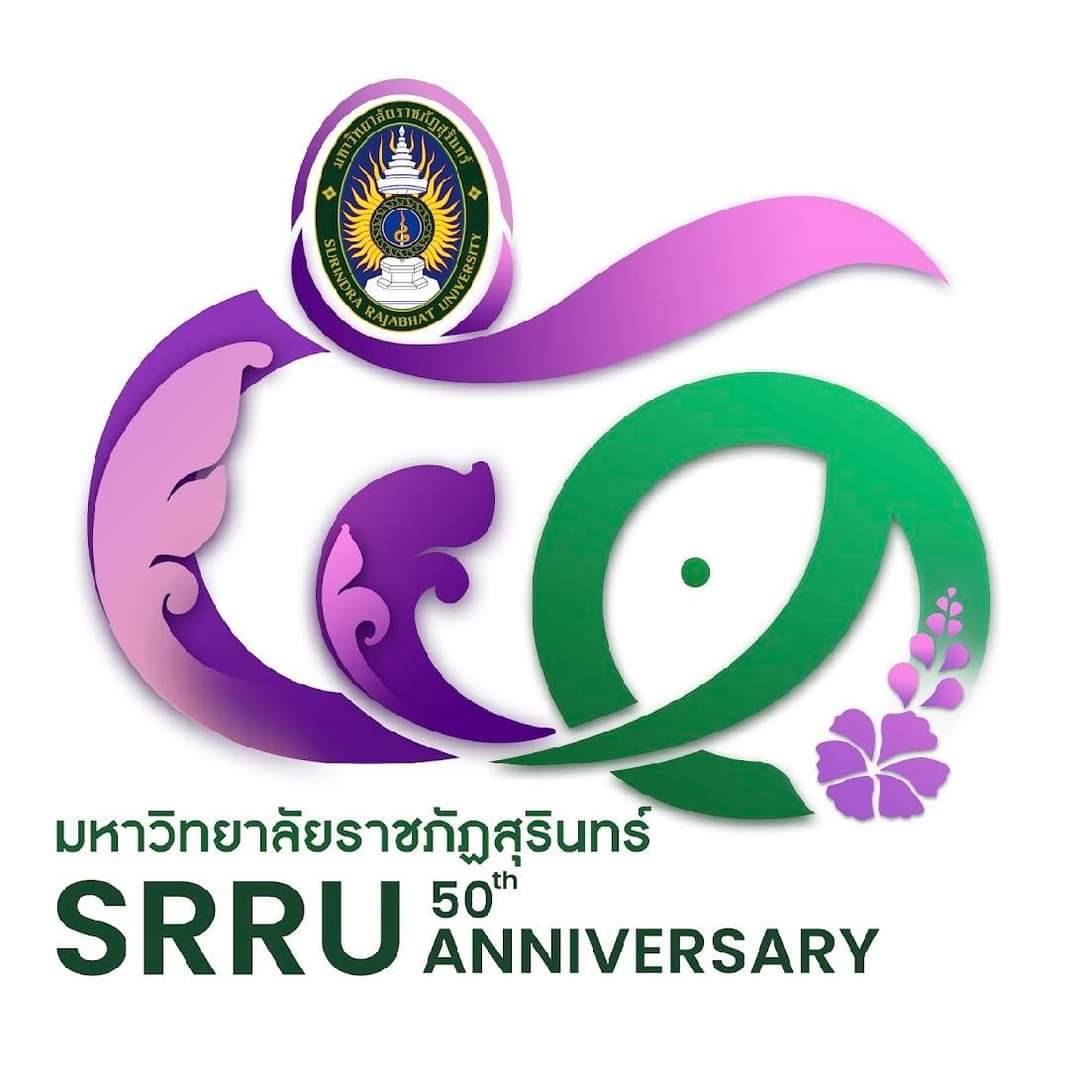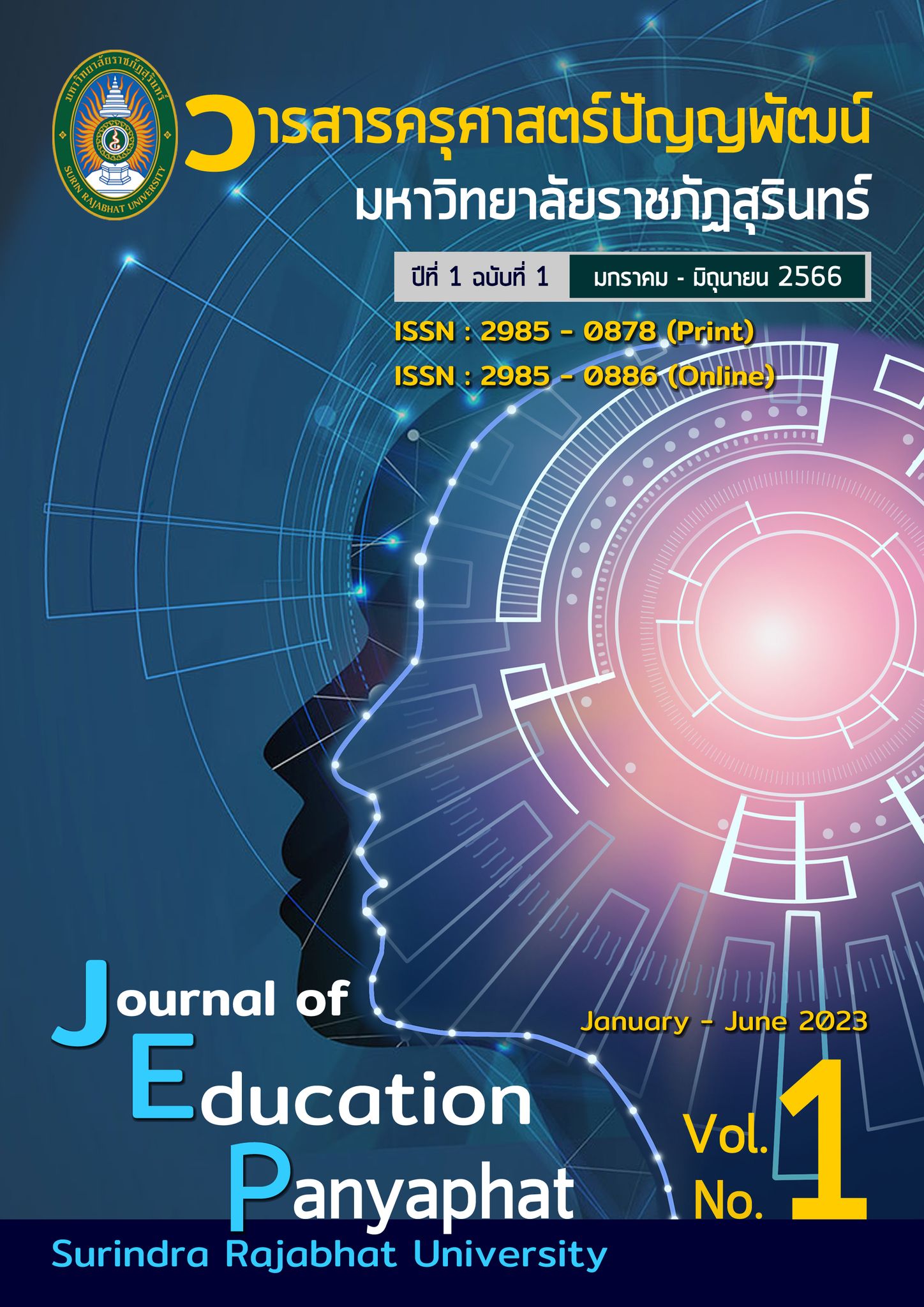ผลการจัดการเรียนรู้โดยใช้วิธีการแบบเปิดที่มีผลต่อผลสัมฤทธิ์ทางการเรียน และทักษะการแก้ปัญหาทางคณิตศาสตร์ ของนักเรียนชั้นประถมศึกษาปีที่ 6
DOI:
https://doi.org/10.65205/jedusrru.2025.3002คำสำคัญ:
การจัดการเรียนรู้โดยใช้วิธีการแบบเปิด, ทักษะแก้ปัญหาทางคณิตศาสตร์, ผลสัมฤทธิ์ทางการเรียนคณิตศาสตร์, เจตคติต่อวิชาคณิตศาสตร์บทคัดย่อ
การวิจัยนี้มีวัตถุประสงค์เพื่อ เปรียบเทียบผลสัมฤทธิ์ทางการเรียนคณิตศาสตร์และความสามารถในการแก้ปัญหาทางคณิตศาสตร์ก่อนและหลังการจัดการเรียนรู้โดยใช้วิธีการแบบเปิด และศึกษาเจตคติต่อคณิตศาสตร์หลังการจัดการเรียนรู้โดยใช้วิธีการแบบเปิด กลุ่มตัวอย่างเป็นนักเรียนชั้นประถมศึกษาปีที่ 6 ปีการศึกษา 2566 โรงเรียนเทศบาล 5 สีหรักษ์วิทยา อำเภอเมือง จังหวัดอุดรธานี ได้มาจากการสุ่มแบบกลุ่ม เครื่องมือที่ใช้ในการวิจัย ประกอบด้วย แผนการจัดการเรียนรู้ แบบวัดผลสัมฤทธิ์ทางการเรียนคณิตศาสตร์ซึ่งเป็นแบบทดสอบแบบปรนัย 4 ตัวเลือก จำนวน 20 ข้อ ซึ่งมีค่า IOC อยู่ระหว่าง 0.67 – 1.00 ค่าความเชื่อมั่นมีค่าเท่ากับ 0.80 ค่าความยากอยู่ระหว่าง 0.20 – 0.70 และค่าอำนาจจำแนกอยู่ระหว่าง 0.25 – 0.63 แบบวัดความสามารถ ในการแก้ปัญหาทางคณิตศาสตร์ เป็นแบบอัตนัยจำนวน 5 ข้อ มีค่า(IOC) อยู่ระหว่าง 0.67 – 1.00 มีค่าความเชื่อมั่นเท่ากับ 0.81 ค่าความยากอยู่ระหว่าง 0.52 – 0.79 และค่าอำนาจจำแนก อยู่ระหว่าง 0.20 – 0.88 และแบบวัดเจตคติ มีลักษณะเป็นแบบมาตรประเมินค่า 5 ระดับ จำนวน 10 ข้อ มีค่า (IOC) อยู่ระหว่าง 0.67 – 1.00 และมีค่าความเชื่อมั่น 0.80 ผลวิจัยพบว่า นักเรียนชั้นประถมศึกษาปีที่ 6 มีผลสัมฤทธิ์ทางการเรียนคณิตศาสตร์และความสามารถในการแก้ปัญหาทางคณิตศาสตร์หลังการจัดการเรียนรู้โดยใช้วิธีการแบบเปิดสูงกว่าก่อนการจัดการเรียนรู้โดยใช้วิธีการแบบเปิดอย่างมีนัยสำคัญทางสถิติที่ระดับ .05 และนักเรียนมีเจตคติต่อคณิตศาสตร์หลังจากการจัดการเรียนรู้โดยใช้วิธีการแบบเปิดโดยรวมอยู่ในระดับมาก เมื่อพิจารณาเป็นรายด้าน พบว่า นักเรียนคิดว่าวิชาคณิตศาสตร์สามารถนำไปใช้ในชีวิตประจำวันได้มีค่าเฉลี่ยสูงสุด รองลงมา คือ นักเรียนชอบเล่นเกมคณิตศาสตร์ และนักเรียนคิดว่าวิชาคณิตศาสตร์มีประโยชน์ตามลำดับ
เอกสารอ้างอิง
กระทรวงศึกษาธิการ. (2560). ตัวชี้วัดและสาระการเรียนรู้แกนกลางกลุ่มสาระการเรียนรู้คณิตศาสตร์ (ฉบับปรับปรุง พ.ศ. 2560) ตามหลักสูตรแกนกลางการศึกษาขั้นพื้นฐาน พุทธศักราช 2551. กรุงเทพมหานคร : โรงพิมพ์ชุมนุมสหกรณ์การเกษตรแห่งประเทศไทย.
ชัยศักดิ์ ลีลาจรัสกุล. (2543). หลักสูตรและการสอนคณิตศาสตร์โรงเรียนมัธยมศึกษา. กรุงเทพฯ :โรงเรียนสาธิตมหาวิทยาลัยศรีนครินทรวิโรฒ.
ตติมา ทิพย์จินดาชัยกุล. (2557). ผลของการจัดกิจกรรมการเรียนรู้โดยใช้วิธีการแบบเปิด (Open Approach) ที่มีต่อความสามารถในการแก้ปัญหาและความสามารถในการให้เหตุผลทางคณิตศาสตร์ เรื่อง ทักษะกระบวนการทางคณิตศาสตร์ ของนักเรียนชั้นมัธยมศึกษา ปีที่ 3. ปริญญานิพนธ์การศึกษามหาบัณฑิต มหาวิทยาลัยศรีนครินทรวิโรฒ.
ไมตรี อินทร์ประสิทธิ์และคณะ. (2558). การใช้หนังสือเรียนคณิตศาสตร์ที่เน้นกระบวนการแก้ปัญหาของนักเรียน. ขอนแก่น : มหาวิทยาลัยขอนแก่น.
วรรณนิภา สารสุวรรณ. (2563). ผลการจัดกิจกรรมการเรียนรู้วิธีการแบบเปิด (Open Approach) ที่มีต่อ ผลสัมฤทธิ์ทางการเรียนคณิตศาสตร์ และความสามารถในการแก้ปัญหาทางคณิตศาสตร์ ของนักเรียนชั้นประถมศึกษาปีที่ 5. ปริญญานิพนธ์การศึกษามหาบัณฑิต มหาวิทยาลัยรามคำแหง.
วนัญชนา เชิงดี. (2555). การพัฒนาการแก้โจทย์ปัญหาคณิตศาสตร์โดยใช้วิธีการแบบเปิดสำหรับนักเรียนชั้นศึกษาปีที่2. วิทยานิพนธ์ปริญญามหาบัณฑิต มหาวิทยาลัยเทคโนโลยีราชมงคลธัญบุรี, ปทุมธานี.
สุพจน์ ลานนท์. (2557). การพัฒนาแผนการจัดการเรียนรู้โดยใช้วิธีการสอนแบบร่วมมือด้วยเทคนิค TAIร่วมกับวิธีการสอนแบบเปิด กลุ่มสาระการเรียนคณิตศาสตร์ชั้นประถมศึกษาปีที่ 2. วิทยานิพนธ์ปริญญามหาบัณฑิต มหาวิทยาลัยเทคโนโลยีราชมงคลธัญบุรี, ปทุมธานี.
สถาบันส่งเสริมการสอนวิทยาศาสตร์และเทคโนโลยี. (2546). คู่มือวัดผลประเมินผลคณิตศาสตร์.กรุงเทพฯ : สถาบันส่งเสริมการสอนวิทยาศาสตร์และเทคโนโลยี
อรรถพร เพชรสงค์. (2565). การศึกษาความคิดสร้างสรรค์ทางคณิตศาสตร์และเจตคติที่มีต่อคณิตศาสตร์ของนักเรียนชั้นประถมศึกษาปีที่ 5 ที่เรียนด้วยวิธีการแบบเปิด. วิทยานิพนธ์ปริญญามหาบัณฑิต มหาวิทยาลัยสงขลานครินทร.
Becker, J. P., & Shimada, S. (1997). The open-ended approach: A new proposal for teachingmathematics. Reston: National Council of Teachers of Mathematics.
Nohda, N. (1986, August). A STUDY OF "OPEN-APPROACH" METHOD IN SCHOOLMATHEMATICS TEACHING FOCUSING ON MATHEMATICAL PROBLEM SOLVINGACTIVITIES. Tsukuba Journal of Education Study in Mathematics.
ดาวน์โหลด
เผยแพร่แล้ว
รูปแบบการอ้างอิง
ฉบับ
ประเภทบทความ
สัญญาอนุญาต
ลิขสิทธิ์ (c) 2025 วารสารครุศาสตร์ปัญญพัฒน์ มหาวิทยาลัยราชภัฏสุรินทร์

อนุญาตภายใต้เงื่อนไข Creative Commons Attribution-NonCommercial-NoDerivatives 4.0 International License.
ข้อความลิขสิทธิ์










